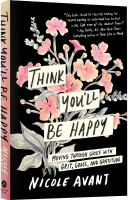This reading group guide for Think You’ll Be Happy: Moving Through Grief with Grit, Grace, and Gratitude includes an introduction, discussion questions, ideas for enhancing your book club, and a Q&A with author Nicole Avant. The suggested questions are intended to help your reading group find new and interesting angles and topics for your discussion. We hope that these ideas will enrich your conversation and increase your enjoyment of the book.
Click here to download a faith-based discussion guide for churches and faith-based study groups.
Introduction
In this powerful and deeply moving memoir, Nicole Avant—daughter of Hollywood royalty and former U.S. Ambassador—invites us on an extraordinary journey of love, loss, and unwavering resilience. From star-studded encounters to the shocking tragedy of her mother’s death, Nicole’s story reminds us that life tests us all, revealing our shared capacity for healing, growth, and profound joy.
With grace and raw honesty, she shows us how to find light in darkness, transform pain into purpose, and live with grit and gratitude no matter what life throws our way.
“Nicole Avant brilliantly weaves through her family’s story and her mother’s tragic death some of the most important cultural themes at this moment in our history—faith, forgiveness, resilience, service, and redemption—and she does it all with grace and the gift of a born storyteller.” — Arianna Huffington, Founder & CEO of Thrive Global
Think You’ll Be Happy are the last words Nicole’s mom wrote to her, a hope-filled promise that reminds us of the role we play in creating our own more positive futures. “We can’t banish evil,” Nicole writes. “We have to learn to swim through trauma, to live for all those who can’t.” Turning grief into inspiration, loss into gratitude, Think You’ll Be Happy provides a universal road map for anyone working to remain positive and anchored in hope.












